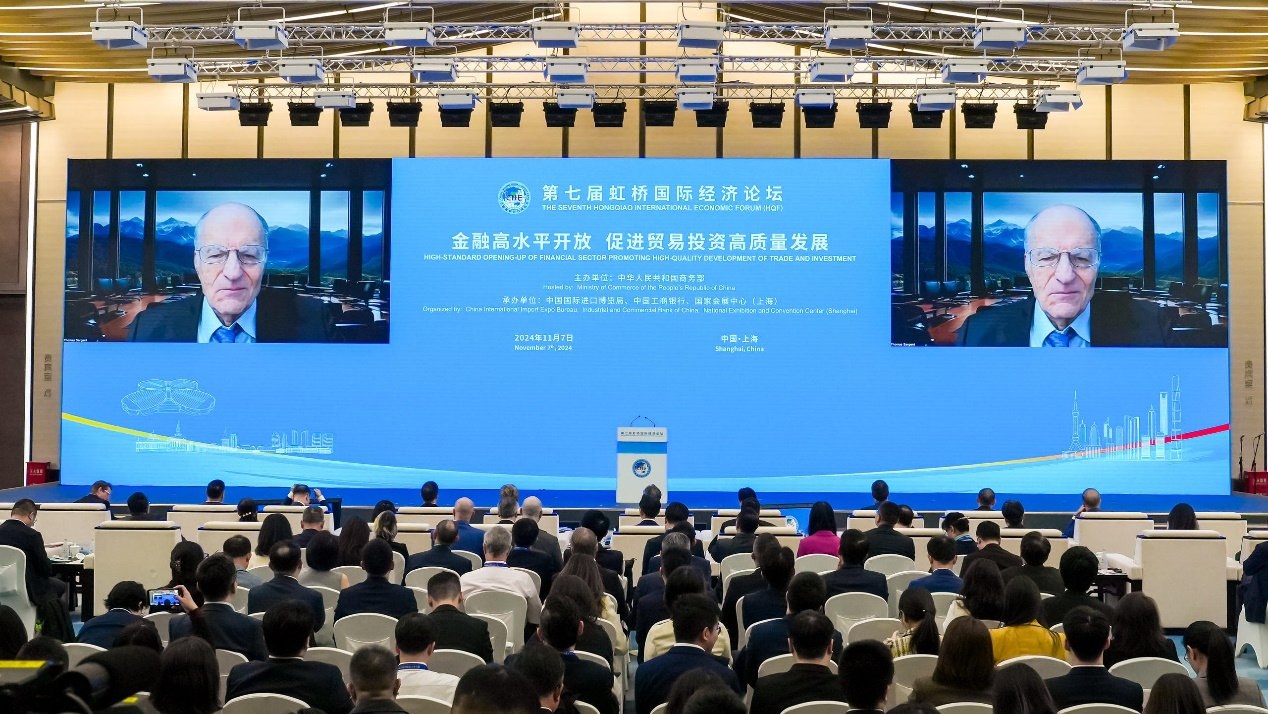Hongqiao International Economic Forum

Opening-up of Financial Sector Boosts Trade and Investment Release date: 2024-11-12 Source:China International Import Expo Bureau

On the morning of November 7, 2024, a sub-forum themed "High-Level Financial Opening up: Promoting High-Quality Trade and Investment Development" took place during the 7th Hongqiao International Economic Forum. Organized by Ministry of Commerce of the People’s Republic of China and co-hosted by the China International Import Expo Bureau, Industrial and Commercial Bank of China (ICBC), and the National Exhibition and Convention Center (Shanghai), the event featured keynote speeches from notable guests including Dilma Rousseff, President of New Development Bank; Liu Jun, President of Industrial and Commercial Bank of China; Manothong Vongsay, Deputy Minister of Ministry of Industry and Commerce of Laos; Wang Ping, Vice Secretary-General of the Shanghai Municipal Government; and Thomas J. Sargent, Nobel Laureate in Economics in 2011.
Dilma Rousseff, President of New Development Bank highlighted the pivotal role of emerging economies, particularly BRICS nations, as engines of global economic growth. Yet, she noted, liquidity shortages continue to challenge these economies’ progress. Rousseff called for reinforced global cooperation to help meet sustainable development goals, especially in financing and debt sustainability, with the aim of collectively improving the efficiency of the global financial system.
Liu Jun, President of Industrial and Commercial Bank of China noted that, despite the headwinds currently facing globalization, the trends of openness and connectivity are irreversible. He pointed to emerging dynamics in global trade and investment, such as the deepening integration of digital technology with service trade, the push for green transitions driven by low-carbon principles, and the growing importance of South-South trade. China's financial sector, he emphasized, has entered a new phase of openness, with a more robust, two-way financial system taking shape at an accelerated pace.
Manothong Vongsay, Deputy Minister of Ministry of Industry and Commerce of Laos, highlighted that Laos’ financial market remains in an early stage of development, dominated primarily by a limited number of commercial banks. He added that in recent years, the Lao government has prioritized banking reforms to bring the nation’s financial system more in line with international standards and best practices.
Wang Ping, Vice Secretary-General of the Shanghai Municipal Government, highlighted that, under the guidance of national financial regulators, Shanghai is expanding both the depth and scope of its financial openness. He emphasized that the city's strategy is twofold: to attract more foreign institutions while also facilitating the global expansion of domestic enterprises, particularly along the Belt and Road Initiative.
Thomas J. Sargent, Nobel Laureate in Economics in 2011 highlighted that China's modern financial sector is at the forefront globally, particularly in fields like digital currency and supply chain digitization. However, he also pointed out that the opening-up of China’s financial sector faces significant challenges, especially in the context of geopolitical dynamics.
The sub-forum also invited other distinguished guests, including Gergely Baksay, Executive Director for Economic Analysis, Magyar Nemzeti Bank (The Central Bank of Hungary); Wang Hailu, General Manager, Global Market Department, Industrial and Commercial Bank of China; Yang Ji, Executive Vice President, Citibank China Co., Ltd.; Alexander Henderik Montanus, General Manager, Raiffeisen Bank International Beijing Branch; Zhai Jingli, Deputy CEO, Sinar Mas Group - APP; and Li Zhiqing, Director of the Center for Environmental Economics and Deputy Secretary of the Party committee of the School of Economics, Fudan University. They engaged in discussions on topics such as green finance, the cross-border use of the RMB, financial market connectivity, and the global expansion of commercial banks.
During the sub-forum, ICBC unveiled several key reports and initiatives, including the Belt and Road Technology Finance (Investment) Index Report, the Initiative under the Belt and Road Interbank Cooperation Mechanism to accelerate the digital transformation of financial services, the Cross-Border Digital Financial e-Services Program, and the ESG Advisory Service System. These initiatives showcased ICBC’s strategies and practical approaches in advancing high-quality global trade and investment development.